AES 145th Convention, 2018 New York, NY, USA
Dates: 2018 Oct 17–20
Location: Javits Center, New York
Papers chairs: Areti Andreopoulou and Braxton Boren. Contact Papers Chairs.
Topics
Proposals describing work in any area of audio engineering and its related arts and sciences will be considered for inclusion in convention sessions. A detailed list of proposed topics is given below.
Categories
Authors may submit proposals in four categories:
1. Complete-manuscript peer-reviewed convention papers
2. Abstract-precis-reviewed convention papers
3. Synopsis-reviewed engineering briefs
4. Workshops/tutorials/masterclasses
Submitting a Proposal
Category 1 and 2 proposals are to be submitted electronically to the AES 145th proposal submission site at www.aes.org/145th_authors by 2018 May 31.
For the complete-manuscript peer-reviewed convention papers (category 1), authors are asked to submit papers of 4–10 pages to the submission site. These complete-manuscript papers will be reviewed by at least two experts in the field, and authors will be notified of acceptance by 2018 July 5. Final manuscript with revisions requested by the reviewers have to be submitted before 2018 July 26. If rejected as a convention paper (Cat. 1), the proposal may still be accepted for categories 2 or 3.
For abstract-precis-reviewed proposals (Cat. 2), a title, 60-to 120-word abstract, and 500- to 750-word précis of the proposed paper must be submitted by 2018 May 31. Authors will be notified of acceptance by 2018 June 28, and the authors must submit their final manuscripts (4 to 10 pages) before 2018 July 26. If rejected from this category, the proposal may be still be accepted as an engineering brief (Cat. 3).
Papers exceeding 10 pages run the risk of rejection without review. If such a paper is accepted the author will be charged a fee of $25 for every page over 10.
For engineering briefs (Cat. 3), authors must supply a short synopsis to http://www.aes.org/145th_ebriefs by 2018 August 1 to indicate their desire to present an engineering brief, followed later by an electronic manuscript. Topics for the engineering briefs can be very wide-ranging. Relaxed reviewing of submissions will consider mainly whether they are of interest to AES convention attendees and are not overly commercial. PDF manuscripts of 1–5 pages following the prescribed template must be submitted by 2018 August 30.
Workshops/tutorials/masterclasses (Cat. 4)
Those wishing to submit proposals for sessions under the above heading should complete the submission form on the EasyChair system for convention workshops. These will be considered by the convention committee for suitability, and may be chosen for one of the convention tracks, or as a stand-alone event. A guide deadline of 8 June 2018 is suggested, but this may be adjusted by the convention committee. For questions about this category of submission, contact the convention chairs.
Registration
Presenting authors of papers and engineering briefs (one per paper for all 3 categories) will be required to pay the full 4-day convention registration fee (member and student member rates are lower than nonmember rates).
Publication in the E-Library
All convention papers will be available in the AES E-Library no earlier than 10 days before the convention starts. All individual AES members now have free access to the E-Library. Any non-member author paying the non-member price for a four day All Access badge will also be given free access to download the convention papers from the E-Library.
Awards
Presenting authors who are student members and whose convention papers (Cat. 1 or 2) are accepted will be eligible for the Student Paper Award at the 145th; peer-reviewed Cat. 1 papers are given preference by the award judges.
Presenting authors of accepted Cat. 1 papers will be eligible for the Best Peer-Reviewed Paper Award.
Poster or Lecture
During the online submission process you will be asked to specify whether you prefer to present your paper in a lecture or poster session. Highly detailed papers are better suited to poster sessions, which permit greater interaction between author and audience. The convention committee reserves the right to reassign papers to any session, lecture or poster.
Schedule
The submission sites will be available by early March.
Proposal (Cat. 1 and 2) deadline: 2018 May 31
Acceptance (précis proposals, Cat. 2) emailed: 2018 June 28
Acceptance (full papers, Cat. 1) emailed: 2018 July 5
Final manuscript (Cat 1 and 2) deadline: 2018 July 26
Engineering brief (Cat. 3) proposal deadline: 2018 August 1
Engineering brief (Cat. 3) 1–5 page PDF deadline: 2018 August 30
Workshops/tutorials/masterclasses (Cat. 4): guide deadline 8 June 2018
Open Access
Authors can pay an additional fee to make papers Open Access. See our Open Access page for more information.
Proposed Topics
Audio applications and technologies
Digital broadcasting
Forensic audio
Automotive audio
Audio for mobile and handheld devices
Audio in education
Networked, Internet, and remote audio
Auditory display and sonification
Interactive sound
New audio interfaces
Web 2.0 technologies
Audio content management
Archiving and restoration
Audio formats
Digital libraries
Automatic content description
Audio and music information retrieval
Audio Processing
Analysis and synthesis of sound
Audio effects
Machine listening
Music and speech signal processing
Auditory scene analysis
High resolution audio
Audio coding and compression
Audio Equipment
Microphones, converters, and amplifiers
Loudspeakers and headphones
Wireless and wearable audio
Instrumentation and measurement
Musical instrument design
Protocols and data formats
Immersive Audio
Multichannel and spatial audio
Audio for Virtual / Augmented Reality Environments
Game Audio
Sound design / acoustic simulation of immersive audio environments
Evaluation of spatial audio
Spatial audio applications
Perception
Audio perception
Audio quality
Hearing loss, protection, and enhancement
Listening tests and evaluation
Speech intelligibility
Psychoacoustics
Recording, Production, and Reproduction
Live event and stage audio
Mixing, remixing, and mastering
Room and architectural acoustics
Sound design and reinforcement
Studio recording techniques
